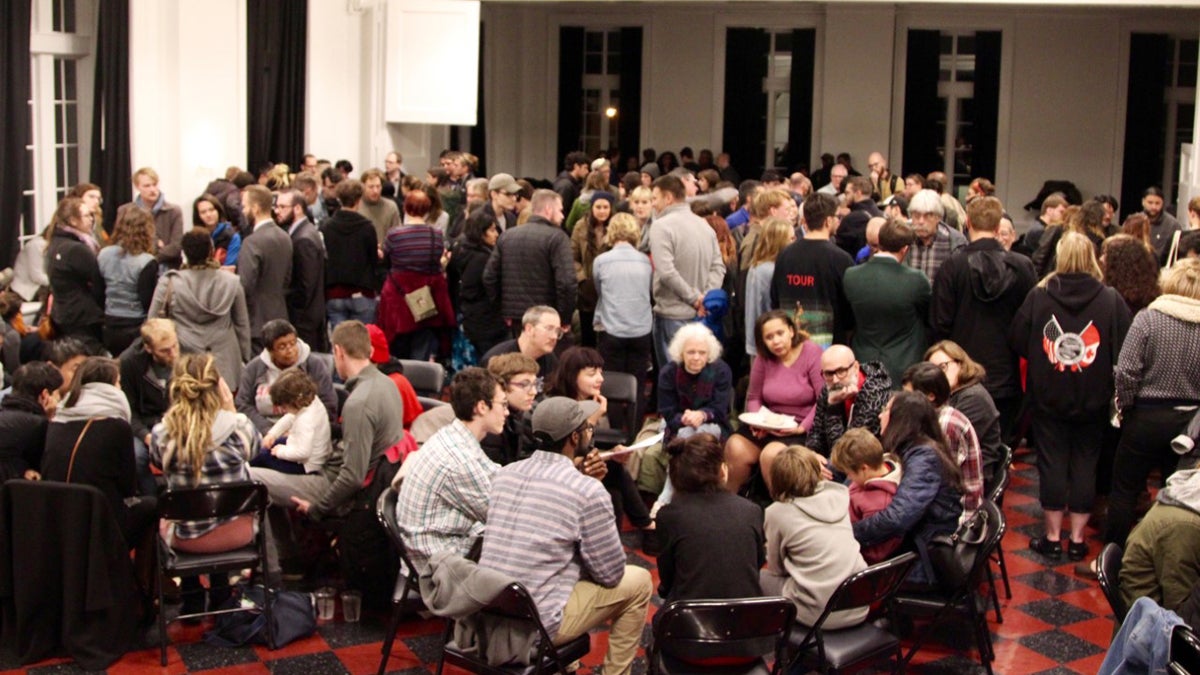Stop Trump: In Philadelphia and Pittsburgh, people protest the President-elect

More than 200 people attended a Trump protest meeting in Pittsburgh Wednesday night at the Ace Hotel. Organizers said they ran out of sign-up sheets until a volunteer handmade more and ran to make more copies. (Katie Blackley / 90.5 WESA)
The election highlighted — among other things — a national divide between rural and urban voters that played out in miniature Wednesday night in Pennsylvania.
While Philadelphia and Pittsburgh organized protests against President-elect Trump, there didn’t seem to be similar events in other parts of the state.
In Pittsburgh last night, more than 200 people packed a meeting to figure out how to deal with a Trump presidency. Organized through Facebook, the event was called “Emergency Meeting: Let’s Unite To Stop President Trump.”
The large ballroom at the Ace Hotel in the city’s East Liberty neighborhood filled to capacity by 6:30 p.m. The crowd overflowed into the stairwell, and then outside, where people took turns speaking from a small balcony.
The emergency meeting was organized to create a plan to push back against a Trump presidency. Attendees broke into small groups to discuss three proposals for action, including building a new political party.
Facilitator Molly Nichols set out the rules of engagement, ending with “Placing blame helps no one, taking responsibility helps everyone.” The room burst into applause.
The stark divide between rural and urban interests is something social worker Jessica Wolfe, 36, has seen a lot of. She travels throughout southwestern Pennsylvania seeing patients in their homes.
“There’s not a whole lot out there anymore, there’s not infrastructure and jobs and things like that. And so, I think the rural people feel abandoned.”
Wolfe says there are drug and crime problems in rural areas that Trump has promised to fix.
But Ron Idoko, 33, who teaches public policy at the University of Pittsburgh, says Trump stoked whites’ fears of non-whites, and those fears drowned out all the other issues at stake in the election.
“I felt like this was more of white America saying ‘we need to make sure we stay white, remain white.’ There were a lot of folks that were just scared of other people,” he said.
Idoko says people are fearful of one another because they don’t cross paths in daily life.
Besides planning civic and political engagement, people talked about their unease.
Nginyu Ndimbie, 26, said he thinks people came out “for the retention of hope. As well as fear. They kind of go hand-in-hand. Even though I do think of this current situation as a possible woe, it also is causing a great amount of reaction and action for people who were formerly a little bit more passive. People realize they need to jump headlong into this.”
After the meeting, the crowd marched through the streets.
WHYY is your source for fact-based, in-depth journalism and information. As a nonprofit organization, we rely on financial support from readers like you. Please give today.


